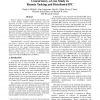Free Online Productivity Tools
i2Speak
i2Symbol
i2OCR
iTex2Img
iWeb2Print
iWeb2Shot
i2Type
iPdf2Split
iPdf2Merge
i2Bopomofo
i2Arabic
i2Style
i2Image
i2PDF
iLatex2Rtf
Sci2ools
121
click to vote
HICSS
1996
IEEE
1996
IEEE
Concurrency: A Case Study in Remote Tasking and Distributed IPC
Remote tasking encompasses different functionality, such as remote forking, multiple remote spawning, and task migration. In order to overcome the relatively high costs of these mechanisms, optimizations can be applied at various levels of the underlying operating system or application. Optimizations include concurrent message transmission, increased throughput and reduced latency at the distributed IPC level; batching, overlapping, and pipelining at the remote tasking level; and multithreading at the application level. Of particular interest is the resulting concurrency, since in a complex program, it may be a dominant performance factor. Distributed IPC is typically characterized by throughput and latency. However, many design and implementation details important for real application performance remain unobserved by this simple characterization. This paper describes distributed IPC from a remote tasking point of view. Remote tasking exercises all aspects of distributed IPC extensive...
Related Content
| Added | 07 Aug 2010 |
| Updated | 07 Aug 2010 |
| Type | Conference |
| Year | 1996 |
| Where | HICSS |
| Authors | Dejan S. Milojicic, Alan Langerman, David L. Black, Steven J. Sears, Michelle Dominijanni, Randall W. Dean |
Comments (0)

